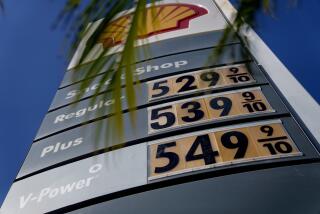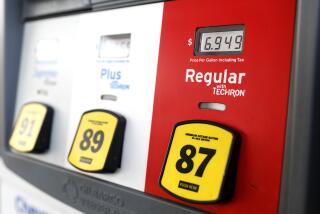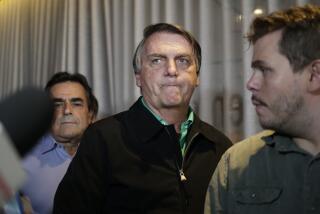Brazilians face higher gas prices, more austerity moves after election
Rising gas prices and the selection of a more fiscally austere economic team have Brazilians facing a period of difficult adjustment after the reelection of President Dilma Rousseff.
Though Rousseff’s second term doesn’t start until January, her administration has already announced plans to squeeze spending and has cut a gas subsidy, raising prices at the pump. The moves are aimed at inspiring investors and other segments of the business community after a marked slowdown this year in the nation’s long-booming economy.
They follow a campaign in which Rousseff, whose support is strongest among the poor, accentuated her left-of-center credentials, and early moves have already hit some of her constituents.
“She won easily here,” said Girley Silva Costa, 31, a teacher in Macapa, capital of the small northern state of Amapa. “But people like her a lot less now that the cost of gas went up.”
After her Oct. 26 runoff victory against a more market-friendly opponent in the nation’s closest presidential vote since democracy was instituted under the 1988 constitution, the company’s state-run oil company, Petrobras, raised prices.
The government of Rousseff, who received 52% of the vote, raised interest rates and, in late November, she selected Joaquim Levy as her new finance minister. Levy is far more economically orthodox than his predecessor.
Levy immediately announced plans to rein in spending and restore investor confidence in the country, whose economic boom ground to a halt in the middle of this year. The business community responded well, but it’s expected that in the short term, cuts will keep growth down as the country is forced to tighten its belt.
At the same time, polarization in Brazilian politics extends beyond friction between the left and the business community.
“Dilma has an extremely short honeymoon period going into her second term,” said Jason Marczak, deputy director at the Atlantic Council’s Adrienne Arsht Latin America Center in Washington. “She only won by a sliver and has big issues to deal with, the largest challenge being the economy.”
In the weeks since the runoff, thousands have taken to the streets of Sao Paulo demanding her impeachment, citing a corruption scandal involving bribes and political party funding that has dogged Rousseff’s government recently. A small but visible minority called for a military coup. Early this month, conservative protesters clashed with security guards as Congress tried to vote on a spending measure, and the session had to be postponed.
“Paradoxically, a segment of the middle class that has benefited from social programs and growth under [the] Workers’ Party is now much more conservative,” said Francisco Fonseca, a political scientist at the Fundacao Getulio Vargas business school in Sao Paulo. “A part of the upper middle class is now comparing their situation to Venezuela, but we don’t have a [Hugo] Chavez or anything like Chavismo.... Dilma has only supported small, gradual changes.”
Brazil, like most of Latin America, has good relations with Venezuela, but since the election, Rousseff has also rejected comparisons between the two countries
In taking a business-friendly approach, Rousseff is reverting to the path trod by her still-popular Workers’ Party predecessor, Luiz Inacio Lula da Silva.
In 2003, after the former union firebrand became the first left-of-center president elected after the fall of Brazil’s military dictatorship, Lula moved quickly toward the moderate center. The sale of commodities to countries such as China and his social programs helped tens of millions of Brazilians rise out of poverty while powering the economy forward.
But under his hand-selected successor, Rousseff, the commodities boom ended, growth has slowed, and her administration’s attempts to revive the economy have often consisted of interventions that diverted from his more traditional economic approach.
Though investors have been pleased with Rousseff’s turn back to the center since the election, the move has dismayed some of Rousseff’s more left-leaning voters who support the government’s social programs and an active role in the economy. Opponents, meanwhile, have accused her of running a disingenuous campaign.
Levy, the finance minister, says there is no contradiction between a painful adjustment period and social progress.
“The economy will be balanced,” he said, “to guarantee that we can continue advancing socially.”
Bevins is a special correspondent.
More to Read
Start your day right
Sign up for Essential California for news, features and recommendations from the L.A. Times and beyond in your inbox six days a week.
You may occasionally receive promotional content from the Los Angeles Times.






